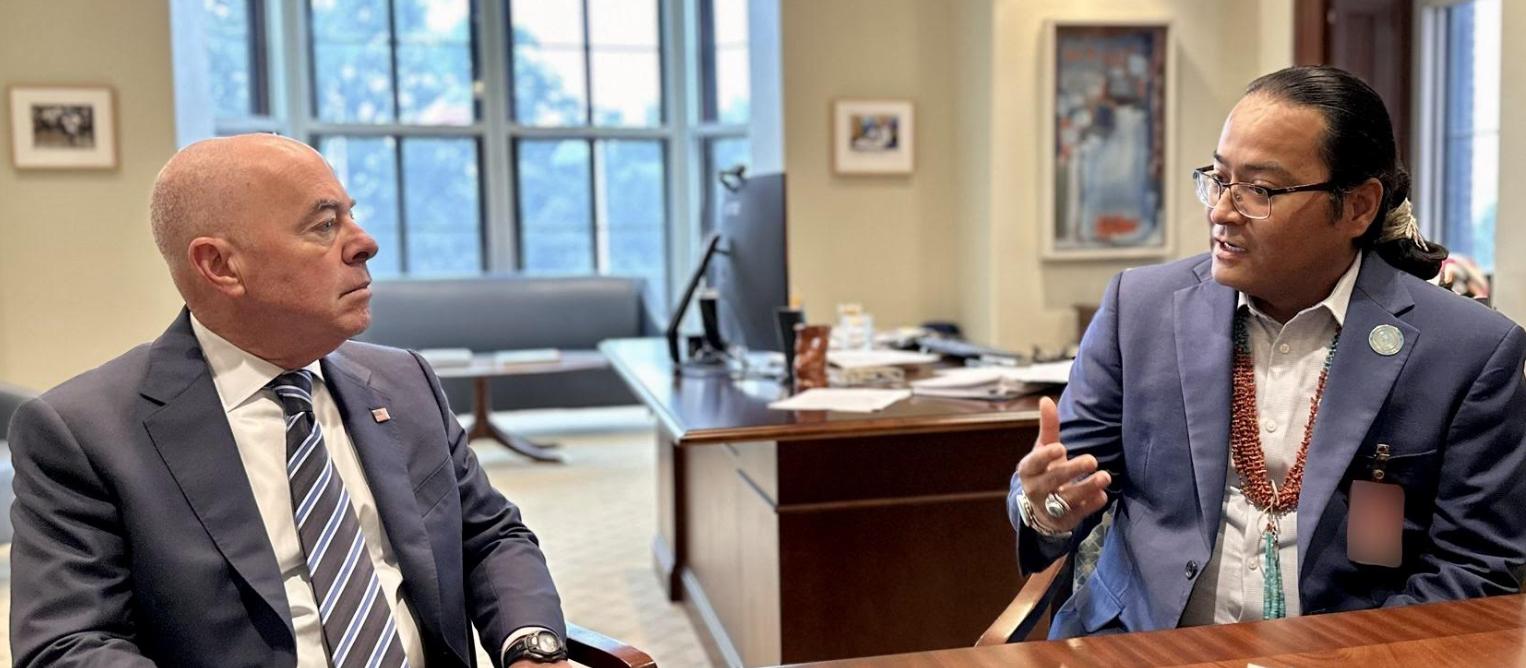
- Details
- By Native News Online Staff
Navajo Nation President Buu Nygren has brought the single most important doctrine of the Navajo Nation to the attention of the highest civilian federal official whose job it is to protect the security of the United States.
In a private meeting Tuesday with Alejandro Mayorkas, secretary of Homeland Security at the Department of Homeland Security, the President asked the secretary to acknowledge and respect Navajo sovereignty in the simplest possible way.
President Nygren asked the secretary to have the federal government acknowledge and sanction the use of Navajo Nation-issued identification cards for voting, travel and other vital activities that require photo identification.
Beginning May 7, 2025, all U.S. citizens will be required to provide REAL ID-compliant identification for air travel and to enter certain federal buildings.
President Nygren explained to Secretary Mayorkas that federal recognition of a Navajo Nation-issued REAL ID, would reduce the burden on Diné citizens and serve as a key expression of the Navajo Nation’s sovereignty.
“Our ability to issue tribal IDs that are recognized across the country is crucial to our sovereignty,” President Nygren said. “We must ensure that our people can travel, vote and access essential services without unnecessary restrictions placed upon them by outside authorities.”
He said this autonomy would protect the Navajo Nation’s right to issue identification that meets federal requirements and preserve the Navajo Nation’s principle of self-determination.
Recent proposals in Congress that could limit the types of tribal IDs that are accepted for voting purposes places unreasonable and likely illegal limits on tribal sovereignty, President Nygren said. Some of these proposals would require tribal Certificates of Indian Blood, known as a CIB, to indicate place of birth. That would add another layer of complexity for tribal citizens.
The President said he would be able to minimize the impact of restrictive federal regulations and continue to promote and protect Navajo Nation sovereignty through the issuance of its own identification documents.
Secretary Mayorkas expressed interest to work with the Navajo Nation on the President’s initiative. He acknowledged the unique challenges that face tribal communities.
He committed to explore how the Department of Homeland Security can support the development and implementation of a Navajo-issued REAL ID-compliant tribal identification program.
The President and secretary also discussed advanced law enforcement training through the Federal Law Enforcement Training Center, collaboration with the Transportation Security Administration, or TSA, and U.S. Customs and Immigration Services.
These federal offices could help the Navajo Nation address travel and border matters, and cybersecurity support from the Cybersecurity and Infrastructure Security Agency in order to protect Navajo infrastructure from digital threats.
President Nygren told Secretary Mayorkas of his priority to safeguard and encourage use of the Navajo language, Diné Bizaad, which is rapidly diminishing among younger generations.
Secretary Mayorkas, a native Spanish speaker, shared his concern about language loss with the President, and both exchanged ideas on how to preserve and revitalize Indigenous languages.
More Stories Like This
NCAI Passes Two Emergency Resolutions on Immigration Enforcement ActivitiesChickasaw Lighthorse Police Officer named Indian Country Law Enforcement Officer of the Year
Indian Gaming Association Rallies Broad Coalition Against Sports Event Contracts It Calls Illegal Threat to Tribal Sovereignty
Navajo Resources and Development Committee Issues Notice on Livestock Inspection Requirements
American Prairie, Tribal Coalition Files Protest Over Rescinded Grazing Rights
Help us defend tribal sovereignty.
At Native News Online, our mission is rooted in telling the stories that strengthen sovereignty and uplift Indigenous voices — not just at year’s end, but every single day.
Because of your generosity last year, we were able to keep our reporters on the ground in tribal communities, at national gatherings and in the halls of Congress — covering the issues that matter most to Indian Country: sovereignty, culture, education, health and economic opportunity.
That support sustained us through a tough year in 2025. Now, as we look to the year ahead, we need your help right now to ensure warrior journalism remains strong — reporting that defends tribal sovereignty, amplifies Native truth, and holds power accountable.
 The stakes couldn't be higher. Your support keeps Native voices heard, Native stories told and Native sovereignty defended.
The stakes couldn't be higher. Your support keeps Native voices heard, Native stories told and Native sovereignty defended.
Stand with Warrior Journalism today.
Levi Rickert (Potawatomi), Editor & Publisher


